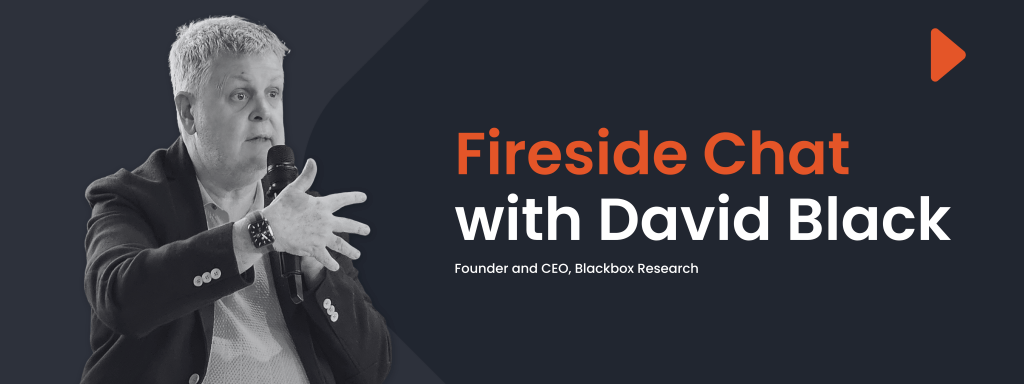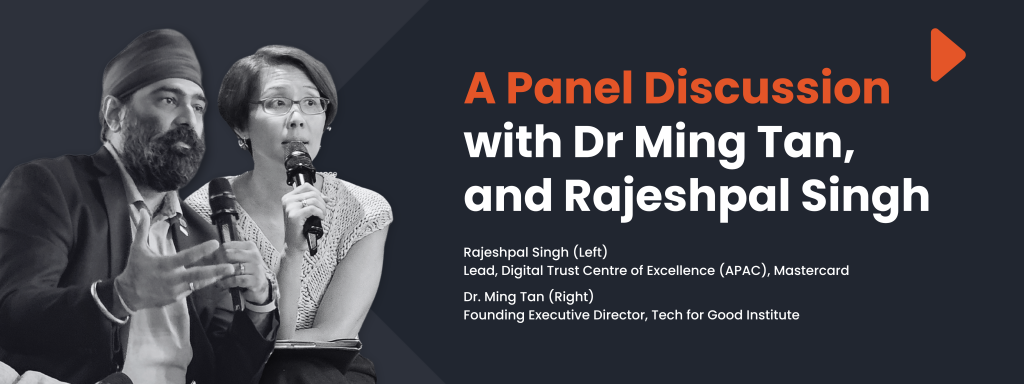Highlights & Insights from SensingSG Connect
SensingSG: A Living Window into Singaporean Sentiment
At our inaugural SensingSG Connect event on 23 November 2023, we welcomed over 50 guests to the Blackbox HQ to have an insightful dialogue about SensingSG, our pioneering research tool, developed with Qualtrics, that provides a living window into contemporary community sentiment in Singapore. Here are some of the highlights from David’s engaging conversation with Joe Boag, Blackbox’s Head of Client Solutions.
On the Provenance of SensingSG:
David, a seasoned market research expert with over two decades’ experience in Singapore, reminisced on the popular 'YouKnowAnot' newsletter, ended during COVID-19, but whose spirit lives on in SensingSG. He explained that SensingSG is not just a modern iteration of this past work, but a sophisticated, contemporary approach to understanding the dynamics in Singaporean society.
On the Unique Features of SensingSG:
SensingSG, a collaboration with Qualtrics, is designed to provide a comprehensive and accessible analysis of public sentiment, said David. It features innovative tools like the 'Good Governance Meter,' which provides an ongoing evaluation of government performance across various sectors. This tool not only measures performance but also offers valuable insights for policymakers and the public to understand the relationship between policy, program effectiveness, and service delivery.
The 'Optimism Index,' gauges public outlook towards the future, while the ‘Media Monitor’ delves into news trends, offering insights into local and international issues resonating with Singaporeans. Each quarter, SensingSG zeroes in on a specific topic of special interest. The current focus is on digital trust, a critical issue given Singapore's vulnerability to online scams. This thematic approach allows for a deep dive into relevant issues, contributing significantly to our understanding of public opinion and trends.
On the Key Insights from Sensing SG:
Rice Bowl Issues Take Centre Stage:
David emphasised the shift in focus among Singaporeans towards 'rice bowl issues' - fundamental concerns related to cost of living, GST hikes, and housing affordability. Despite various societal events and scandals, these core economic worries overshadow other policy areas. He highlighted the sentiment stability in sectors like health and education, pointing out that the government's major policies remain solid amidst these economic anxieties.
Generational and Socioeconomic Divergences:
Another revelation from SensingSG is the distinct difference in perspectives across generations and socioeconomic groups. For instance, the reactions of Gen X and Y individuals, particularly those entering the housing market or starting families, differ markedly from other demographic segments. These insights underscore the need for nuanced analysis of diverse groups within Singapore's society.
Transformation and Shifting Aspirations:
The third insight pertains to Singapore's ongoing transformation. This change is not just generational leadership shifts but also in the evolving nature of aspirations due to the country's historical success. David pointed out the underlying anxieties masked by government subsidies and support, emphasising the importance of monitoring these sentiments, especially during significant transitions like upcoming leadership changes.
On the Impact of SensingSG and Its Future:
David then discussed SensingSG's potential to revolutionise insights delivery. Emphasising the need for real-time, actionable insights, he acknowledged the past limitations of delayed survey results. SensingSG aims to provide clients with timely, sophisticated data accessible at their convenience, fostering a proactive approach to understanding and responding to public sentiment.
On Partnering with Qualtrics:
The collaboration with Qualtrics was highlighted as essential for SensingSG's success. Qualtrics' expertise in working with governments globally enhances the platform's capability in terms of scalability, security, and comparative analysis. This partnership allows for a broader perspective on governmental service delivery trends and citizen experiences, enabling Blackbox and other agencies to adapt to the rapidly evolving expectations of Singaporeans.
Concluding Thoughts
David concluded his session with a reaffirmation of SensingSG's role as a transformative tool in modern market research. It not only provides a lens to view current sentiments but also equips policymakers, researchers, and the public with the data needed to navigate and respond to the nation's dynamic landscape. SensingSG stands as a symbol of Blackbox’s commitment to progress, offering insights that are both deep and accessible, ushering in a new era of data-driven decision-making in Singapore.
The Evolution of Citizen Experience and the Future of Government Services
We had the pleasure of welcoming Phillip Bland, Global Government Advisor at Qualtrics, to discuss the evolving landscape of government services and the critical role of experience management. Phillip, recognised as a leading international authority in this field, shared his insights and the vision behind the partnership with Blackbox for the SensingSG initiative.
On Embracing Digital Transformation:
Phillip emphasised the urgency for governments to embrace digital solutions for agile and real-time insights. Reflecting on his journey and the origins of SensingSG, he remarked, "From the very first sentence in my discussion with Blackbox, I was 100% aligned with the values and capabilities of delivering digital, real-time agile insights to government."
On Trust and Empathy in Good Governance:
Highlighting the interplay of insights and empathy in governance, Phillip underscored the importance of understanding individual experiences to foster trust and advance equity. He pointed out, "You cannot increase trust or advance equity unless you understand every individual's experience."
On Technology as a Catalyst for Empathy:
Phillip shared his experiences in harnessing technology to gain real-time insights, especially during natural disasters and the COVID-19 pandemic. He believes that technology can act as a team member, creating empathy towards citizens' diverse needs.
On the Digital Evolution of Governments:
Tracing the journey from process-driven to digitally enabled governance, Phillip explained the shift in government services over the last two decades. From business process optimisation to the gradual digitisation of services, he observed a rapid change during COVID-19, where citizens' digital expectations soared.
On the New Journey for Government Services:
Phillip outlined a repeatable journey for modern government services, focusing on guiding citizens effectively, lowering their effort to access assistance, and supporting them through complex challenges. This approach aims to close gaps in service delivery and promote collaborative efforts across different sectors.
On Dynamic Instrumentation and Actionable Intelligence:
The trend in citizen research is shifting from passive methods to dynamic instrumentation, where digital tools capture insights in real-time and in context. Phillip stressed the importance of moving from repetitive reporting to actionable intelligence, enabling governments to be more responsive and evidence-based.
On Embedding Empathy in Governance:
Phillip's vision is to embed empathy in governance, making government services more human. This involves continuous learning, propagating insights in useful ways, and rapidly adapting these insights into the flow of business.
Concluding Thoughts:
Concluding his talk, Phillip underscored the importance of collaborative partnerships like SensingSG in understanding social sentiment and creating responsive government services. He concluded, "Tools like SensingSG are pivotal in truly understanding broad-scale social sentiment and creating services that respond to those needs."
Trust in the Digital Domain: A Singapore Perspective
In our final session, we delved into the topic of digital trust in Singapore. The proliferation of online harms and scams are contributing to a growing sense of insecurity online, which has become a pressing issue of attention at national and regional levels. This conversation, involving Dr Ming Tan and Raj Singh, moderated by Glenn Wray, explored the complexities and solutions surrounding digital trust and cybersecurity. Here are some highlights.
On Rising Digital Insecurity and its Implications:
The data from SensingSG revealed alarming trends: one in four Singaporeans know someone affected by cybercrime in the past year, and a growing number feel less secure online. This rising insecurity poses significant challenges at both personal and macro levels, impacting trust in digital systems and services.
On the Scam Epidemic and Its Impact:
Raj shared his recent striking realisation from the discussion that scams are no longer targeting just the vulnerable or less tech-savvy. Instead, they increasingly affect working-age individuals, shaking the very foundation of trust in digital platforms. The aftermath of these scams extends beyond financial loss, leading to a broader skepticism towards digitalisation and creating hurdles for governments and organisations in promoting digital services.
On Regional Insights around Digital Trust:
Looking beyond Singapore, Dr Tan spoke of observations on accelerated digital adoption in the Southeast Asian region, with new internet users primarily accessing the digital world through mobile devices. This shift underscores the urgency of fostering digital trust and safety to harness the full potential of technological advancement for economic and social progress.
On the Role of Institutions in Building Trust:
The conversation highlighted that trust is often placed more in institutions than in the technology itself. As Dr Tan aptly pointed out, “Trust – like risk – is in the eye of the beholder… It is like bread; it must be baked fresh every day. Trust comes from every interaction, not just from the technology that you deploy.”
This pattern is evident in SensingSG's findings, where government and banking institutions ranked highest in trust. However, the recent DBS disruption served as a reminder that even the most trusted institutions are not immune to challenges, emphasising the need for continuous improvement in digital systems.
On AI and Public Perception:
The discussion briefly touched on artificial intelligence (AI), noting that many Singaporeans feel less secure due to AI technologies. A key takeaway emphasised by Raj was that AI, like any technology, is neither inherently good nor bad; its impact depends on how it's utilised. Effective public-private partnerships and adherence to ethical standards in AI deployment are crucial.
On The Disconnect Between Awareness and Action:
A striking point was the dissonance between the growing concern for online security and the lack of proactive measures taken by individuals. Even though most people recognise the shared responsibility in enhancing personal cybersecurity, many fail to take concrete steps to protect themselves.
On Cyber Resilience - A Collective Responsibility:
The experts concluded by saying that shifting the focus from cybersecurity to cyber resilience is vital. This approach involves adapting to the evolving digital landscape, where everyone plays a role in maintaining safety – from government bodies to individual users. It calls for a holistic approach, integrating respect, vigilance, and responsibility at every level of society.
Concluding Thoughts:
The SensingSG discussion on digital trust in Singapore highlighted the complexities of navigating the digital landscape. It illuminated the need for collective efforts in building a resilient digital ecosystem, where trust and security are not just government responsibilities but a shared commitment across all sectors of society.
Blackbox looks forward to hosting and taking part in many similar events in 2024, where we will share our original insights and perspectives with anyone who has an interest in the contemporary community dynamics of Southeast Asia. Be sure to sign up to our newsletter and follow us on LinkedIn to ensure you stay up to date.
Don’t miss a beat. Click the icon to follow Blackbox on LinkedIn, and fill out the form below to sign up to our newsletter or send us a message.



